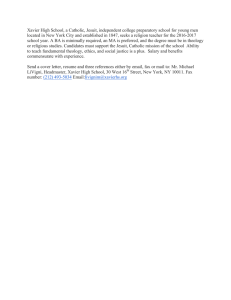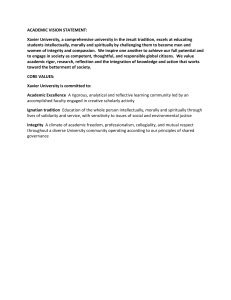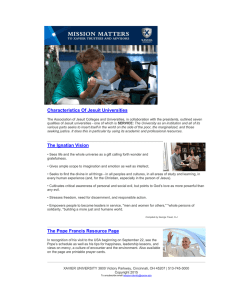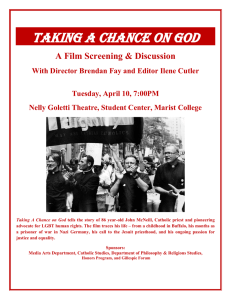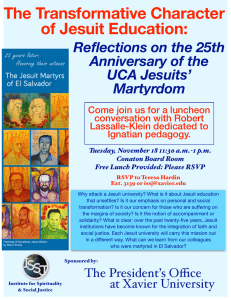GENERAL EDUCATION AT XAVIER UNIVERSITY
advertisement
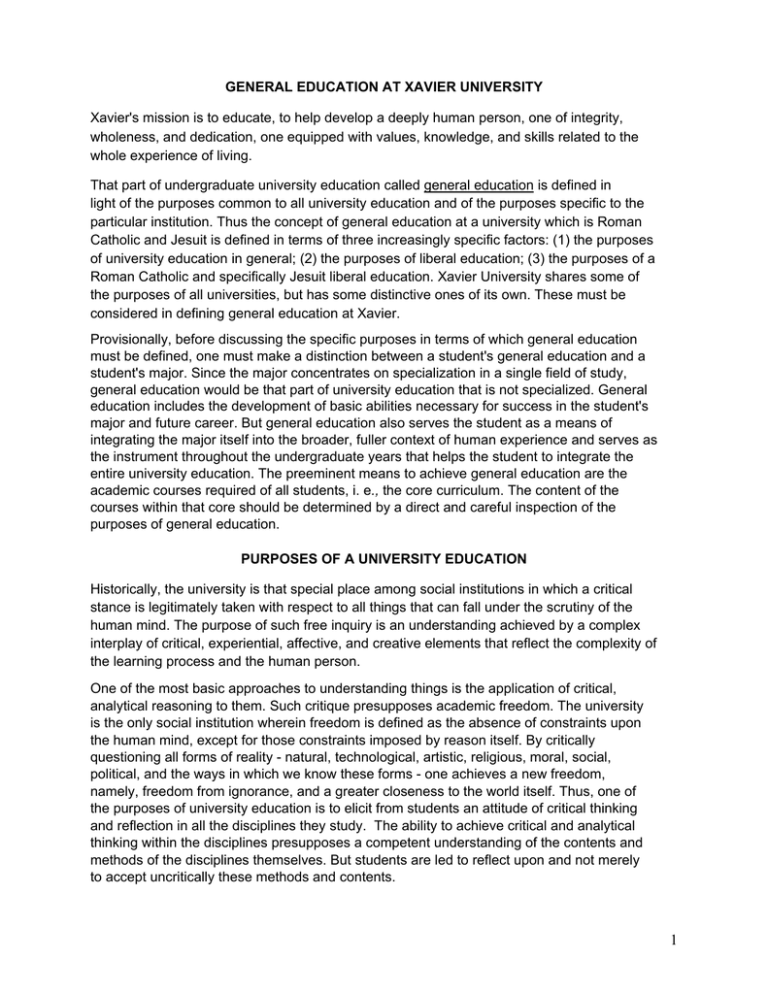
GENERAL EDUCATION AT XAVIER UNIVERSITY Xavier's mission is to educate, to help develop a deeply human person, one of integrity, wholeness, and dedication, one equipped with values, knowledge, and skills related to the whole experience of living. That part of undergraduate university education called general education is defined in light of the purposes common to all university education and of the purposes specific to the particular institution. Thus the concept of general education at a university which is Roman Catholic and Jesuit is defined in terms of three increasingly specific factors: (1) the purposes of university education in general; (2) the purposes of liberal education; (3) the purposes of a Roman Catholic and specifically Jesuit liberal education. Xavier University shares some of the purposes of all universities, but has some distinctive ones of its own. These must be considered in defining general education at Xavier. Provisionally, before discussing the specific purposes in terms of which general education must be defined, one must make a distinction between a student's general education and a student's major. Since the major concentrates on specialization in a single field of study, general education would be that part of university education that is not specialized. General education includes the development of basic abilities necessary for success in the student's major and future career. But general education also serves the student as a means of integrating the major itself into the broader, fuller context of human experience and serves as the instrument throughout the undergraduate years that helps the student to integrate the entire university education. The preeminent means to achieve general education are the academic courses required of all students, i. e., the core curriculum. The content of the courses within that core should be determined by a direct and careful inspection of the purposes of general education. PURPOSES OF A UNIVERSITY EDUCATION Historically, the university is that special place among social institutions in which a critical stance is legitimately taken with respect to all things that can fall under the scrutiny of the human mind. The purpose of such free inquiry is an understanding achieved by a complex interplay of critical, experiential, affective, and creative elements that reflect the complexity of the learning process and the human person. One of the most basic approaches to understanding things is the application of critical, analytical reasoning to them. Such critique presupposes academic freedom. The university is the only social institution wherein freedom is defined as the absence of constraints upon the human mind, except for those constraints imposed by reason itself. By critically questioning all forms of reality - natural, technological, artistic, religious, moral, social, political, and the ways in which we know these forms - one achieves a new freedom, namely, freedom from ignorance, and a greater closeness to the world itself. Thus, one of the purposes of university education is to elicit from students an attitude of critical thinking and reflection in all the disciplines they study. The ability to achieve critical and analytical thinking within the disciplines presupposes a competent understanding of the contents and methods of the disciplines themselves. But students are led to reflect upon and not merely to accept uncritically these methods and contents. 1 The university seeks to unfetter the human spirit as well as the human mind, thereby affording individuals the opportunity to develop their whole being. To grow in wisdom, students are encouraged to explore the world through the multiple avenues to truth that reflect the complexity of the human spirit. Therefore, the learning process involves experience and discovery, collective problem-solving, affectivity, intuition, and active engagement in the world. For human understanding to move forward and for the individual student to develop fully, creativity in inquiry and expression needs to be encouraged. Without this creative, innovative aspect of human thought none of the great scientific, moral, cultural, or political revolutions would have been possible. Accordingly, students are encouraged to explore new paradigms as well as to understand the ones through which humankind has viewed and currently views the world. Furthermore, since we are social beings as well as individuals, learning and knowledge cannot be brought about in a vacuum. Thus, university education encourages active engagement of faculty and students together in an on-going quest for understanding and truth. Recognizing this multifaceted character of human learning and personal development, the university seeks ways of making students and faculty into a vital community of active learners, inquirers, discoverers, and creators. PURPOSES OF A LIBERAL ARTS EDUCATION A liberal arts education is both the education of free people and education that frees. It frees by means of the various arts or disciplines that cover the broad range of human experience, disciplines not directed merely to the securing of the provisions necessary for life, but aimed at perfecting the highest and most specifically human abilities. Thus, the principal purpose of liberal arts education is to develop the intellectual, imaginative, and moral abilities of the person. Liberal arts education frees not only by providing the content of the humanities and the sciences but also by emphasizing abilities necessary to analyze meaningfully the material one learns, to organize and integrate knowledge, to break out into new areas and acquire new knowledge. These are abilities necessary to free oneself from the tutelage of one's teachers, and thus to become independent. Liberal education is intended to free one from the conflict that comes from not having an integrated rational and emotional life: it aims at providing the conditions within which the student can see the connections between the various aspects of knowledge and human experience and can begin to construct his or her own unified perspective on the world and the place of humanity in it. Thus, a liberal education is one that encourages the study of the many complex issues that cross the disciplines. Students learn to understand and analyze the ethical and moral implications of technology, the impact of social issues on the economy, the problems of the connection between various kinds of religious beliefs and politics, and other such interdisciplinary problems. To understand and analyze such problems requires specific expertise in many subject areas, a critical mentality that goes beyond the individual disciplines, and a comprehension that takes account of the complexity of human nature (the rational, the creative, the emotive). Liberal education is the beginning of a life long personal integration which leads to practical, wise, and sensitive action in the world. 2 PURPOSES OF A ROMAN CATHOLIC AND JESUIT EDUCATION Liberal arts education at a Roman Catholic and Jesuit institution is characterized by the conviction that the pursuit of intellectual activity, that is, the study of the world and of humanity, leads to God. This affirmation stems from longstanding Catholic conviction that the truths about the world and humankind found out by natural reason cannot conflict with the beliefs of faith as revealed in Scripture since both reason and faith have a single origin in God. Hence, there exists at such an institution a stress upon the rational study of humanity and the world in the various disciplines and of God in Theology and in certain parts of Philosophy. Moreover, commitment to and reflection upon the Christian tradition requires serious dialogue not only with other Christian traditions, the world religions, and atheism, but also with secular thought generally. This dialogue is necessary if the Catholic tradition is to be appreciated for its distinctiveness and if that tradition is to remain in communication with the world. Education at a Catholic and Jesuit institution is also directed at the spiritual enrichment of the whole person, at the integration of the spiritual into the person's educational experience, and at the nurturing of a strong sense of personal values. Such education is directed at the integration of moral character so as to create sensitivity to the needs of our time, and so as to instill a sense of moral responsibility in career choice, and a sense of duty to become a contributing member of society. In its commitment to a faith that does justice, the Catholic tradition combines a sober realism with a fundamental optimism. It recognizes the brokenness of individuals and the evil often embedded in social structures. Yet it affirms the basic goodness of the world and of humanity and it grounds its hope in Jesus Christ. With this hope the Catholic tradition can face the great evils of the world and encourage people to work for justice. Because of this commitment, general education at Jesuit universities has as one of its goals to make students sensitive to the ethical issues that can be raised in many disciplines and that often cross disciplines. Jesuit education has traditionally emphasized the study of ethics with an eye not only to the intellectual study of the subject but also to responsible moral action. Education at Xavier University continues to express the values and vision of St. Ignatius Loyola, the founder of the Society of Jesus. In accordance with his vision, Xavier encourages students to reason critically and think creatively, to communicate effectively, to be open to all worthwhile studies, to pursue wisdom in confidence and freedom. Education at Xavier also helps students to find God in all things, to achieve their purpose in life, to learn to discern what is truly good for themselves and society - and so to live. The initial paper on the philosophy of “General Education at Xavier University” was drafted by the Core Curriculum Committee, reacted to in open forum and written statement by members of the faculty, and then extensively revised in light of this constructive criticism. The final form was ratified by the faculty in May of 1989. 3
